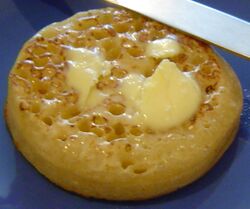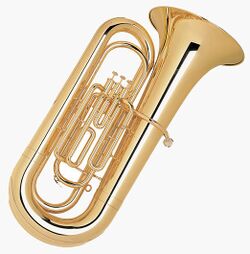Crumpet
A crumpet is a delectable bit of nourishment, invented and popularised by the British, and greedily protected by them to the extent that you shall never find a decent, true crumpet beyond the shores of the United Kingdom. Indeed, one of the distinguishing features of the upper-crust British gentleman (outside of his monocle, his spats, and his gloriously mustachio'd face) is his crumpet. An upper-crust British gentleman sallies forth against the day with a placid mien and a stiff upper lip. And without fail, you shall find, beneath that stiff upper lip, a crumpet, being chew'd and savor'd with utmost propriety. An American is nothing without his brashness, wantonness and vulgarity; a British man is nothing without his crumpet.
Contrary to the anæmic imaginations of the denizens of the former holdings of the British Empire, a crumpet is most certainly not a scone, nor is it an English muffin -- perish the thought! Nor, indeed, is it a "tuffet", a "puppet", a "poppet", a "dung pit", or a "trumpet". You ass.
History
As legend -- nay, fact -- would have it, crumpets were invented in 1327 by Edward II during his incarceration at Berkley Castle -- shortly before an assassin thrust a red-hot poker into his anus. The invention came about when Edward, bored to the point of tears, and consoling himself by blowing bubbles in his milk through a reed, hit upon the idea of blowing bubbles into some dough. The result was the earliest form of Crumpet (known originally as a krampoez or crempot), which quickly grew to unprecedented popularity.
Within a few decades, the Crumpet became a valuable source of nourishment for the nation, as well as being used informally as currency, ensuring, to the glee of the ruling classes, that the hungry remained poor, and the poor remained hungry. A very crisp subset of standard Crumpets were also developed for use as weapons, similar in form to a discus; however the art of this baking has long since been lost.
In 1357, the Second War of Scottish Independence resulted in Scotland being declared Crumpet non grata, and expelled from the Kingdom of England. All crumpets were removed from Scotland, and the mighty oaken gates of Hadrian's Wall were clapped shut against the encroaching, filthy, scone-loving Scots.[1] In a clear case of "making a silk purse of a sow's ear",[2] the porcine Scots revel in their isolation to this day, pointing to their charming little parliament, their soccer team, and their regal buttocks-rest made entirely of scones as evidence of their independent national identity. Sad, really.
In 1634, the Great Crumpet, a weapon of magnificent design, was used to put down the Scone Rebellion, in which a vicious band of Scones rampaged through northern England, wreaking havoc and terrorizing poor peasants with whipped cream and jam.
At some point during the 16th Century, the Crumpet became inextricably linked with Butter, though the reasons for this are still unclear. By 1708, the necessity of the use of Butter with Crumpets was thoroughly understood by most; however, the barbarian custom of eating Butterless Crumpets persisted in many rude, rural areas, such as Totenham and Bristol. So, to prevent the ignorant lower classes from attempting the manœuvre known as the Butterless Crumpet, the Butter your Crumpets Act was passed by Parliament to ensure that the exquisite nature of Crumpets with Butter would be driven into the skulls of the nonconforming masses. The Act introduced serious penalties, including Impalement, Defenestration, and Foot-Tickling, for the making and/or eating of Butterless Crumpets.
In 1726, it is believed that Sir Isaac Newton had discovered a solution to the problem of squaring the circle with the help of a particularly-chewy crumpet, thus invalidating the rules of Euclidean geometry in the process, and putting the lie to all of reality. The solution was believed to be based on a revised value for pi -- "five and a bit", as Newton phrased it in a letter to Henry Oldenberg. However, Newton thankfully died before ever publishing his theorem, leaving the very firmament of reality itself unshaken.
Consumption
Consumption of Crumpet occurs at Tea Time. This is not a specific time on the clock, but is rather a state of mind. Tea is held to have many magical powers, and Crumpet is known to act as a catalyst to Tea. Tea Time can only occur if both Tea and Crumpet are present; without Crumpet, the event is known as "Cup o’ Tea". If Scones are present, the correct term is "Cream Tea". If a Foreigner confuses these terms, they will be either transported to the colonies, or sent to the Tower Of London, an enormous, infamous edifice on the Banks of the Thames which serves a dual purpose as a prison for ignorant foreigners[3] and the National Tea Shop.
Use as currency
In 1931, the Gold Standard was abandoned in Great Britain and the Crumpet Standard was instead adopted in the Crumpet And Sundry Bread-Adjacent Products Act. This Act formalised hundreds of years of informal Crumpet-based local economies. At the time of adoption of the Crumpet Standard, one Crumpet was worth £1 Sterling. At today's exchange rates, one Crumpet would be worth around £380,000, or $600,000 US.
The Crumpet is used exclusively within Great Britain, with The Pound Sterling (£) being used externally. This situation arose following what has now become known as the 1935 Incredulous Foreigner Fiasco, where no other nation would accept a baked bread-based product as currency. In order appease these Foreigners, the Pound Sterling was re-introduced, for use by Tourists and Foreigners.
Today, Crumpets are produced in huge Industrial Bakeries run by the Government-appointed Hovis Warburtons conglomerate. In these high-security bakeries, the currency is "baked" from raw ingredients, including flour, yeast, and air imported in canned form from the Alps, as the yodelling helps the texture.
Use in hunting

Crumpets, being one of Earth's most perfect foods (especially when slathered with Marmite® or marmalade), make for an especially effective bait. As such, crumpets are used all over the world today for hunting; usually referred to as "animal crumping", this is the most common form of Crumpet hunting.
The most popular trap used is known as the dangle me butter. This is where the hunter hooks a Butter-topped Crumpet[4] and dangles it in front of the prey, completely mesmerising it, and giving the hunter enough time to seize the animal and remove its genitals.[5]
In some cases, the hunter may choose to bring down his prey with a Crumpet Gun, a breech-loading, matchlock blunderbuss which fires overcooked Crumpets at a muzzle velocity of around 100 feet per second.[6] Although the technology exists to make repeating Crumpet Guns, or even Crumpet cartridges (for ease of reloading), most gentlemen eschew these "improvements" for being unsporting, and utilise a weapon of the original design.
Use as sexual aids
Dripping with butter, moist, warm -- the thrusting of a fresh-baked Crumpet into the oral orifice is, indeed, a climactic experience. While the aphrodisiac nature of the wonderful Crumpet has long been known to ignorant villagers and the exalted nobility alike, the sexual uses of Crumpets were not described in written form until the year 1972, by Alex Comfort M.B.[7] Ph.D.[8] in his book, "The Joy of Crumpets". This seminal work explained and illustrated many positions, including the Crumpled Crumpet, the Baker’s Dozen, and the Holey Crumpet, and explored, in great detail, both the Crumpet's nooks and its crannies. The book became a best-seller overnight, and Crumpet popularity surged to new heights--
I say, what-ho, lads! What is the meaning of this?! The Internet is not the place for discussions of sex!
See also
Footnotes
- ↑ Metaphorically speaking, of course, as the gates had long ere been removed. In actuality, the Scots were merely shoved to a point north of the wall, and told to "stay there!"
- ↑ A pastime at which the Scots excel, having had much practice.
- ↑ Which is, of course, utterly redundant
- ↑ The only proper sort, of course. Have you been paying attention?
- ↑ The only proper aim of a gentleman hunter. Have you been paying attention?
- ↑ While most projectiles perform uniformly poorly at this velocity, it is only at this speed that the Crumpet reaches the apex of its destructiveness.
- ↑ Master Baker
- ↑ Phallic Doctorate
| Featured version: 8 June 2012 | |
| This article has been featured on the main page. — You can vote for or nominate your favourite articles at Uncyclopedia:VFH. | |


